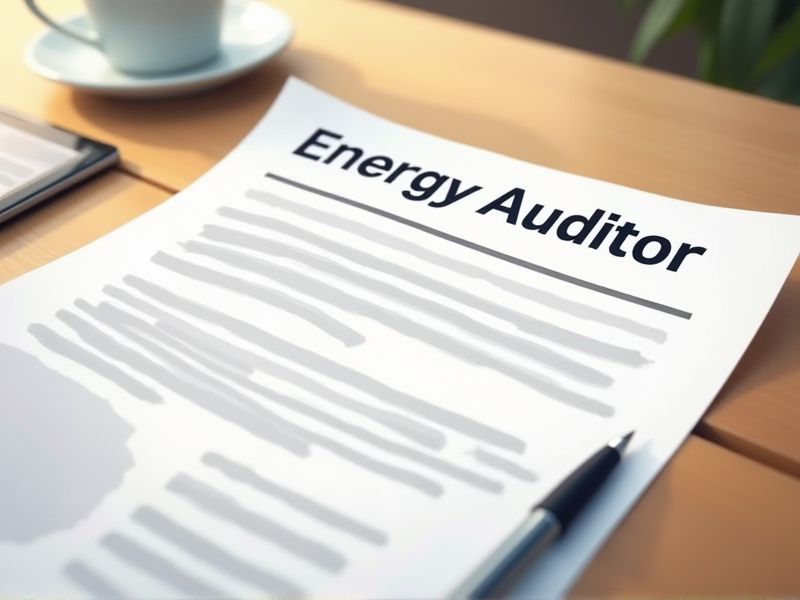
Energy auditors play a pivotal role in evaluating building energy efficiency, which directly impacts operational costs and sustainability efforts. Certification ensures that energy auditors possess the requisite skills to accurately assess energy usage and suggest effective conservation measures. Specific certifications demonstrate an auditor's ability to adhere to industry standards and provide reliable, actionable data to stakeholders. These are key certifications valuable for someone pursuing a career as an Energy Auditor certified in Energy Auditing.
Certified Energy Auditor (CEA)
The Certified Energy Auditor (CEA) designation provides recognized standards and credibility in the energy auditing industry, ensuring auditor competence and professionalism. Certification equips auditors with updated knowledge on energy-efficient technologies and practices, leading to more accurate and impactful audits. Companies employing certified auditors often experience significant energy cost savings and improved sustainability outcomes. Regulatory bodies and clients increasingly require CEA certification to meet compliance and industry benchmarks, solidifying its importance.
Certified Energy Manager (CEM)
Certified Energy Managers possess comprehensive knowledge in energy systems and management, which enhances an Energy Auditor's technical auditing skills. Their expertise in identifying, evaluating, and implementing energy efficiency projects leads to more effective energy conservation strategies. They also provide credibility and trust in energy auditing processes, which is crucial for stakeholders and clients. CEMs help navigate regulatory standards and financial incentives, maximizing the benefits derived from energy audits.
Certified Measurement & Verification Professional (CMVP)
The CMVP certification ensures that energy auditors possess the expertise to accurately assess and verify energy savings, crucial for maintaining credibility and client trust. Energy efficiency projects often involve substantial investments, and the CMVP credential provides assurance that auditors can deliver reliable savings estimates. The program equips professionals with standardized methodologies, reducing the risk of discrepancies and enhancing the quality of their audits. Energy policies and regulations frequently demand third-party verification, making CMVP indispensable for auditors to align with industry standards and compliance requirements.
LEED Accredited Professional (LEED AP)
Having a LEED Accredited Professional (LEED AP) credential enhances an Energy Auditor's understanding of sustainable building standards and green building practices. This comprehension can directly influence the energy auditing process by emphasizing efficiency improvements aligned with LEED criteria. Energy audits become more holistic when incorporating LEED principles, potentially unlocking more LEED-specific incentives and opportunities. Clients seeking both energy efficiency and adherence to sustainability standards may find dual expertise in LEED and energy auditing particularly valuable.
ISO 50001 Energy Management System Lead Auditor Certification
The ISO 50001 Energy Management System Lead Auditor Certification equips energy auditors with the necessary framework to assess and enhance an organization's energy management practices. By acquiring this certification, auditors gain a standardized approach to evaluating energy performance, ensuring consistency and reliability in audits. Certified individuals can help organizations achieve greater energy efficiency, aligning with global sustainability goals. The certification also enhances the auditor's credibility and value, potentially leading to more career opportunities in the energy sector.
Building Performance Institute (BPI) Building Analyst Certification
The Building Performance Institute (BPI) Building Analyst Certification equips energy auditors with the technical skills required to conduct comprehensive home energy assessments. This certification ensures they can effectively identify areas for energy savings and optimize residential energy consumption. It also enhances credibility and trust with clients who seek qualified professionals for reliable energy evaluations. Earning this certification often leads to increased job opportunities and aligns energy auditors with industry standards and best practices.
Energy Efficiency Practitioner (EEP)
Energy efficiency practitioners (EEPs) provide specialized knowledge that complements the technical analysis performed by energy auditors, enhancing the overall assessment process. Their expertise in implementing energy-saving strategies can translate audit findings into practical actions, often resulting in significant cost reductions for businesses. Energy auditors focus on identifying inefficiencies, while EEPs facilitate targeted interventions to address these issues. Collaboration between the two roles ensures not only accurate identification of energy loss but also effective application of solutions.
Passive House Consultant (PHC)
A Passive House Consultant provides specialized knowledge on the Passive House standard, which complements the general assessment skills of an Energy Auditor. Passive House standards emphasize energy efficiency, requiring expertise that goes beyond regular energy auditing practices. The consultant can identify specific design and construction adjustments necessary to meet rigorous energy efficiency targets. In collaboration, they ensure that energy audits align with the stringent requirements of Passive House certification, enhancing overall building performance.
Certified Building Commissioning Professional (CBCP)
A Certified Building Commissioning Professional (CBCP) enhances an Energy Auditor's ability to ensure that building systems operate efficiently, as intended by design specifications. This certification equips auditors with advanced knowledge of system verification and testing, which complements their energy auditing skills. CBCPs can better identify and rectify inefficiencies in building systems, leading to optimized energy performance. Building owners often require CBCP certification for complex projects, creating more opportunities for Energy Auditors in the industry.
Green Building Certified Professional (GBCP)
Green Building Certified Professionals possess specialized knowledge in sustainable building practices, which complements the technical expertise of an Energy Auditor. This combination enhances the ability to identify and implement energy-saving strategies that align with green building standards. By integrating both certifications, professionals can deliver holistic solutions that reduce energy consumption and lower environmental impact. Knowledge from the GBCP aids in navigating complex regulations and incentives associated with sustainable building practices.
Summary
With an Energy Auditor certification, you can expect enhanced job opportunities, as employers often prioritize certified professionals for roles focused on efficiency improvements. Your expertise in energy auditing will likely lead to increased responsibility in identifying cost-saving measures and sustainability initiatives. Obtaining additional certifications further validates your skills, which can lead to career advancement and possibly higher remuneration. The certifications equip you with the latest industry standards, making you a valuable asset in the evolving energy sector.
